
GEOJOURNAL
Scope & Guideline
Empowering Scholarship in Geography and Planning
Introduction
Aims and Scopes
- Urban Dynamics and Sustainability:
Research on urbanization patterns, sustainability practices, and the socio-economic impacts of urban growth, including case studies on cities across various continents. - Environmental Change and Management:
Studies that assess climate change impacts, land use changes, and environmental degradation, employing remote sensing and GIS methodologies to analyze ecological trends. - Social Dimensions of Geography:
Exploration of social issues such as migration, inequality, and community resilience, focusing on how geographical contexts shape social dynamics and human experiences. - Health and Well-being:
Investigations into the intersections of geography and health, including studies on public health accessibility, environmental health risks, and the socio-economic determinants of health. - Cultural Geography:
Examinations of cultural practices, heritage, and identity formation within geographical contexts, emphasizing the role of place in shaping cultural narratives. - Geospatial Technology Applications:
Utilization of GIS, remote sensing, and spatial analysis techniques to solve complex geographical problems, enhance urban planning, and inform public policy.
Trending and Emerging
- Climate Change Adaptation and Resilience:
There is a notable increase in research focused on understanding and mitigating the impacts of climate change on various communities, emphasizing adaptive strategies and resilience planning. - Geospatial Data Science:
The integration of advanced geospatial technologies and data science techniques in geographical research is trending, with studies utilizing machine learning and big data analytics for spatial analysis. - Urban Health and Well-being:
Research that links urbanization with health outcomes is rapidly emerging, highlighting the importance of green spaces, accessibility to healthcare, and urban planning for public health. - Social Equity and Spatial Justice:
Increasing attention is being paid to issues of social equity and spatial justice, exploring how geographical disparities affect marginalized communities and influence access to resources. - Crisis and Conflict Studies:
The examination of geographical dimensions of crises, such as migration due to conflict or environmental disasters, is gaining prominence, reflecting global socio-political dynamics.
Declining or Waning
- Traditional Agricultural Studies:
Research focusing solely on traditional agricultural practices and their impacts has decreased, possibly due to a shift towards more integrative studies that consider broader socio-economic and environmental contexts. - Historical Geography:
Studies centered exclusively on historical geographical analysis have waned, as contemporary issues like climate change and urbanization take precedence in discussions about geography. - Generalized Environmental Policy Studies:
Research that addresses environmental policy without a geographical lens has become less prominent, reflecting a trend towards more location-specific and context-sensitive analyses. - Static Land Use Planning:
Research that focuses on static models of land use without considering dynamic factors such as climate change impacts and urban growth patterns is less frequently published. - Local Community Studies in Isolation:
Investigations that analyze communities in isolation from broader geographical or socio-political contexts have seen a decline, as interdisciplinary approaches gain traction.
Similar Journals

Geografia-Malaysian Journal of Society & Space
Advancing Knowledge in Geography and Social SciencesGeografia-Malaysian Journal of Society & Space, published by the esteemed Universiti Kebangsaan Malaysia through its Faculty of Social Sciences & Humanities, stands as a vital platform for scholarly discourse in the fields of geography, social sciences, and spatial studies. With its ISSN 2180-2491 and E-ISSN 2682-7727, this journal emphasizes the importance of regional studies, fostering a deep understanding of societal dynamics within the Malaysian context and beyond. Although currently lacking impact factor and HIndex data, the journal is poised to contribute significantly to academic discussions, urging researchers, professionals, and students to explore spatial complexities influencing social structures. Geografia aims to publish high-quality, peer-reviewed works, focusing on innovative theoretical and empirical research that addresses contemporary issues in society and space. By promoting open access to its content, it ensures that knowledge is freely available, furthering academic engagement and collaboration in the global scholarly community.
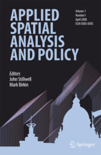
Applied Spatial Analysis and Policy
Transforming data into actionable policy solutions.Applied Spatial Analysis and Policy, published by Springer, is a leading journal dedicated to advancing knowledge in the field of spatial analysis and its application in policy-making. With an ISSN of 1874-463X and an E-ISSN of 1874-4621, this peer-reviewed journal has been at the forefront of geographical research since its inception in 2009 and continues to thrive with a convergence extending to 2024. As a recognized publication in the Geography, Planning and Development category, it holds a commendable Q2 quartile ranking for 2023 and is positioned at rank #238 out of 821 in the Scopus classification, reflecting its strong impact and relevance within the academic community with a percentile of 71. The journal provides a robust platform for researchers and professionals to explore innovative methodologies and empirical studies that enrich spatial policy frameworks. While access to individual articles is not open access, its significant contribution to the field makes it a vital resource for anyone involved in spatial analysis and related disciplines.
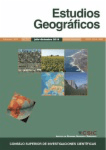
Estudios Geograficos
Unveiling Earth's Processes Through Open Access ResearchEstudios Geograficos, a prominent journal published by the CONSEJO SUPERIOR INVESTIGACIONES CIENTIFICAS-CSIC in Spain, serves as a vital platform for advancing the fields of geography and earth-surface processes. With an ISSN of 0014-1496 and E-ISSN of 1988-8546, the journal has been committed to Open Access since 1996, ensuring that its valuable research is accessible to a global audience. Recognized as a Q3 journal in both Earth-Surface Processes and Geography, Planning and Development, it plays a crucial role in shaping understanding and policy related to our planet. As of 2023, it holds a respectable rank of 562nd in Social Sciences Geography and maintains a percentile standing, reflecting its significance within the academic community. Covering a diverse range of topics, Estudios Geograficos aims to foster scholarly dialogue and disseminate innovative interdisciplinary findings, providing researchers, professionals, and students with critical insights and tools to address contemporary geographic challenges.

Geoadria
Sharing Pioneering Research in Open Access FormatGeoadria, an esteemed Open Access journal published by the University of Zadar in Croatia, has been at the forefront of disseminating valuable research since its inception in 1996. With a keen focus on atmospheric science, demography, earth-surface processes, and geography, this journal serves as a crucial platform for researchers and professionals aiming to explore the intricate relationships between these fields. Although it currently holds a Q4 quartile ranking in various categories, such as Atmospheric Science and Geography, its commitment to promoting innovative scholarly dialogue ensures its relevance and utility within the academic community. Geoadria is indexed in Scopus, with rankings that reflect its ongoing contribution to the social sciences and earth sciences, notably garnering attention in niche areas. With a dedication to open access since 1996, the journal stands as a testament to the University of Zadar's commitment to enhancing global knowledge. Researchers, professionals, and students interested in geography, demography, and environmental sciences will find Geoadria a vital resource for the latest empirical studies and theoretical discussions.
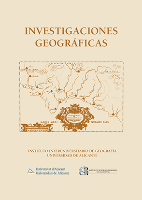
Investigaciones Geograficas-Spain
Championing empirical studies for impactful geographical solutions.Investigaciones Geográficas-Spain is an esteemed academic journal published by the Universidad de Alicante, dedicated to advancing the fields of geography, planning, and development as well as earth and planetary sciences. With its commitment to open access since 1983, the journal ensures that research is readily available to a global audience, facilitating knowledge dissemination and collaborative discourse. As reflected in its 2023 Scopus rankings, it holds a commendable position within the Q3 category in both Earth and Planetary Sciences and Geography, Planning and Development, making it a noteworthy resource for scholars and practitioners in these disciplines. The journal's scope encompasses diverse geographical research, aiming to address pressing environmental and societal challenges through empirical studies and theoretical advancements. By contributing to the knowledge reservoir from Spain and beyond, Investigaciones Geográficas-Spain serves as a vital platform for researchers, professionals, and students seeking to enrich their understanding of geographical phenomena.
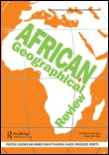
African Geographical Review
Navigating Earth-Surface Processes Across the African ContinentAfrican Geographical Review is a pivotal academic journal published by Routledge Journals, Taylor & Francis Ltd, whose mission is to advance knowledge and understanding of geographical dynamics across the African continent. With an ISSN of 1937-6812 and an E-ISSN of 2163-2642, this journal consistently delivers high-quality research, showcasing innovative perspectives and interdisciplinary approaches within the fields of Earth-Surface Processes and Geography, Planning and Development. Recognized in 2023 with a Q2 ranking in these categories, it ranks #231 out of 821 in Social Sciences and #63 out of 179 in Earth and Planetary Sciences according to Scopus metrics, reflecting its substantial impact and relevance. Featuring research that spans various geographic themes, the journal not only champions academic inquiry but also fosters a deeper understanding of spatial and environmental challenges unique to Africa. Engaging with a diverse audience of researchers, professionals, and students, the African Geographical Review serves as an indispensable resource for those committed to enhancing geographic scholarship and informing sustainable development practices across the continent.
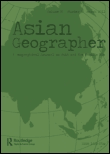
Asian Geographer
Uncovering Insights into Asia's Geographical LandscapeAsian Geographer is a prominent journal published by Routledge Journals, Taylor & Francis Ltd, recognized for its significant contributions to the field of geography, planning, and development. With an ISSN of 1022-5706 and an E-ISSN of 2158-1762, the journal offers a platform for high-quality, peer-reviewed research that addresses vital geographical issues, particularly within the Asian context. The journal's commitment to fostering informed discourse is reflected in its Q2 category ranking in the field of Geography, Planning and Development as of 2023, and its Scopus ranking of #274 out of 821 in the same category, placing it in the 66th percentile. The Asian Geographer serves as an essential resource for researchers, professionals, and students alike, ensuring access to a wealth of knowledge that influences policy and practice. It continues to publish original research and reviews as it converges to present significant developments in geography from 1982 to 1987, 1991 to 1995, and from 2015 to 2024. This journal is vital for anyone looking to deepen their understanding of geographical dynamics in Asia and beyond.

Journal of Geography-Chigaku Zasshi
Contributing to a Sustainable Future through GeographyJournal of Geography - Chigaku Zasshi is a distinguished publication that serves as a crucial platform for the dissemination of research in the realm of geography and earth sciences. Published by the TOKYO GEOGRAPHICAL SOC in Japan, this journal is indexed with an ISSN of 0022-135X and an E-ISSN of 1884-0884. With a scope that includes Earth-Surface Processes, Geography, Planning and Development, Geology, Geophysics, and Global and Planetary Change, it provides comprehensive coverage of pressing geographical issues. Although it holds a Q4 ranking in multiple categories as of 2023, the journal presents an opportunity for researchers, professionals, and students to contribute meaningful findings in a diverse and competitive landscape. The Journal of Geography actively promotes scholarly dialogue by embracing the complexities of our planet and encouraging innovative approaches to geographical inquiries. This open-access journal aspires to bridge gaps and foster collaboration among scholars worldwide, underscoring its importance in understanding and addressing contemporary geographic challenges.

Journal of Geovisualization and Spatial Analysis
Empowering Scholars with Open Access to Geospatial DiscoveriesJournal of Geovisualization and Spatial Analysis, published by SpringerNature, is an influential open-access journal specializing in the cutting-edge fields of geovisualization, spatial analysis, and their application in earth sciences and geography. Since its inception in 2017, this journal has established a prominent stance with a high impact factor and prestigious Q1 rankings across multiple categories, including Computers in Earth Sciences, Earth and Planetary Sciences (miscellaneous), and Geography, Planning and Development. The editorial board is committed to advancing innovative research and methodologies, providing a platform for scholars to disseminate their findings globally. With impressive Scopus rankings—placing it in the top percentiles among its peers—the journal serves as a vital resource for researchers, professionals, and students keen on understanding spatial data and its implications for geographic science. Its emphasis on rigorous peer review and rapid publication enhances accessibility to substantive research, thus fostering knowledge sharing within the scientific community. Based in Switzerland, the journal promotes a collaborative environment for interdisciplinary studies, making it an essential read for anyone involved in spatial analysis research.

Boletin de la Asociacion de Geografos Espanoles
Illuminating the landscape of geographical science and urban development.Boletin de la Asociacion de Geografos Espanoles is a leading open-access journal dedicated to advancing knowledge in the fields of geography, urban studies, and environmental science. Published by the ASOCIACION ESPANOLES DE GEOGRAFIA, this esteemed journal has been a vital platform for geographers and researchers since 1984, facilitating the dissemination of high-quality research and insights. With an ISSN of 0212-9426 and E-ISSN of 2605-3322, the journal has been recognized for its contributions, currently ranking in Q3 in Earth-Surface Processes, Environmental Science, and Geography, Planning and Development, as well as Q2 in Urban Studies for 2023. The journal’s accessibility ensures a broad audience reach, supporting the engagement of researchers and professionals alike. Located in Madrid, Spain, and publishing from 2006 to 2024, the Boletin de la Asociacion de Geografos Espanoles stands as an essential resource for those invested in the geographical sciences and related disciplines.